Kyousougiga is a very interesting show; it’s interesting to watch, and to discuss. Not only that, but I consider it to be excellent, enough that I’ve given it the title of “Best Anime of 2013“. Kyousougiga is a family drama, at its heart, but it does very interesting things with the structure of the show, and it also ties them to the theme of the show, to its heart, which is what I will discuss in this write-up (the structure of which is also giving me a hard time, as every single thing relies on the others).
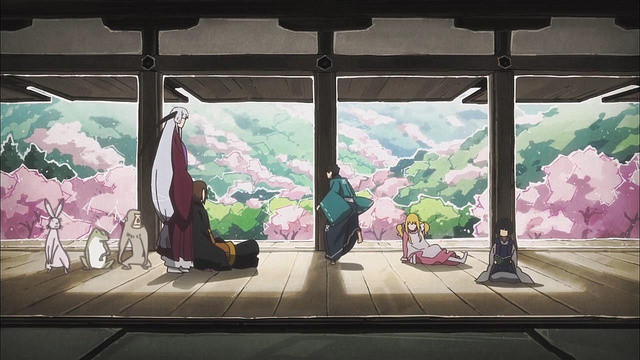
(This is a Things I Like post, it’s not a review, but more a discussion of the show and of ideas that have risen in my mind as I’ve watched it. There will be spoilers of many major plot-points. I will also include some spoilers for Uchouten Kazoku (The Eccentric Family), but mostly discussing what is the premise of that show.)
I think that before discussing the themes, it might be best to discuss the overall structure of the show.
Episode o0 – is a remake of the original ONA/OVA content, but better animated, for the most part. It explodes with energy and colour, and is hard to follow, or make a lot of sense of. If you don’t like it, still proceed to episode 1, where the tempo is quite different.
Episodes 1-2 – We get to view the family, and we get to see Koto’s background. The energy here is still more or less boundless, but here we get to see this is truly a story about family, here we get some structure, and some poignant moments.
Episodes 3-5, and half of episode 6 – These are the siblings’ stories. This is getting to meet the world through its principal characters, this is meeting the family.
Episodes 5-7 (Yes, there is overlap)- This to me is the true heart of the show, we get to see what this story is about, we’re bombarded with richly symbolic moments that show us the true undercurrent of the show, we get to have some resolution, and we have build-up for the final confrontations.
Episodes 8-10 – The end-game. The mask is dropped, and all the players in this little play are exposed for what and who they are. “Mythic” doesn’t begin to describe the scale of what happens. But in the end, all the themes are laid out explicitly, and the family-drama nature is shown to have been the crux of the world, of the story, all along.
Why did I bother laying out the episodes’ structure and what each part deals with? On the one hand, and that is why that part is before the “Read More” tag; it’s aimed at people who’ve watched episode 00 and didn’t continue, or people who watched up to episode 2 and didn’t continue, because the show was too flashy, and they had felt lost. Alternately, for people who watched up to episode 5 and felt it a tad “dull”. In that case, and I admit this is indeed a complaint that can be directed at the show, it has quite a few tonal shifts, and the show really throws you into the midst of things and then constructs the story around you.
Also, for the sake of this post I’ve rewatched episode 00 to episode 3, and while it’s true that you don’t have to watch it, especially as some material from it is re-used or altered for the “main series”, and it often confuses more than it sets things to light, I still strongly suggest watching episode 00. Episode 00 sets down the relationships, and the way the different characters interact with one another, in a manner that may not be sufficiently fleshed-out otherwise, or perhaps it’ll be missing in order to interpret the relationships properly otherwise.
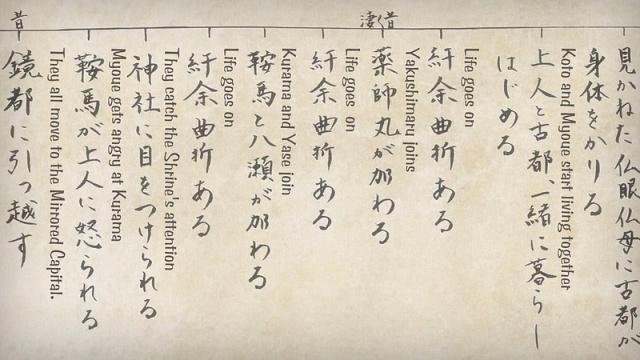
The other reason I began with the episodic breakdown is actually to counter the point made in the above paragraph – this story is always a dedicated family drama, and while its tone, and the method of the telling changes throughout the series, what the series is about never changes. We’re thrown into a story where three siblings rule a weird world, and an energetic girl who falls into this cloistered world and wreaks havoc. We learn of the event that is the linchpin to the story, that the characters cannot escape from, and which controls not only their destinies, but their minds – being abandoned by their parents. Our triumvirate of godling rulers of this strange world are nothing but children wishing for their parents’ return.
The story is told in segments, each in another time, focusing on different characters. We see the characters in the present, and learn of what is moving them, their old wounds, their desire to return to their old family-structure, to meet once more with their parents. And then we have segments in the past, showing us the characters as children, and we learn more of their present situation, we see that the family, although it’s been a happy one, had not been one without its share of problems, without its share of pains; trying to meet up to your parents’ expectations, being abandoned while being given a duty by said parents, to guard their home, to take up their mantle.
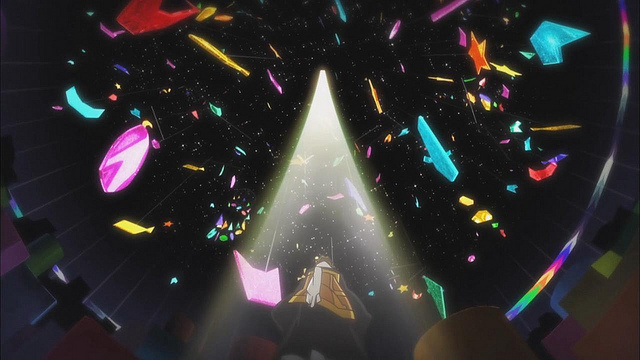
The reason I belabour the story-structure so much is that I think it’s an excellent metaphor for the thematic heart of the show. I think the show does a truly admirable job of cyclical storytelling, we revisit the same moments, and we advance moment by moment, several hundred years apart, and we learn of the present by revisiting the past, and we learn of the past by watching the present unfold. Everything revolves around a single event, and understanding the event is necessary in order to understand the place where our cast is, even as it is necessary to view our cast in order to understand the event that constituted them as such.
And so we finally reach the thematic heart of the show – family is cycles without end. Kyousougiga is a show about wanting to surpass, escape, be re-united with, and gain the approval of parents against whom we rebel. Kyousougiga is a show about wanting to be adults, in a setup that can never admit us as such. The situation between parents and their children is such that we always strive to show our parents how we’ve grown up, how we are adults of our own now, but we need their approval, their confirmation, that we had indeed become adults. Needing their consent, their confirmation, however, shows us that in our re-union with our parents, we’re returned to the role of the subservient children, of those who come seeking a pat on the head, a comforting hug. We seek adulthood, we seek to pass our parents, but in requiring our parents’ confirmation of the above, we reveal that we can never truly do that, so long as we still look up to our parents.
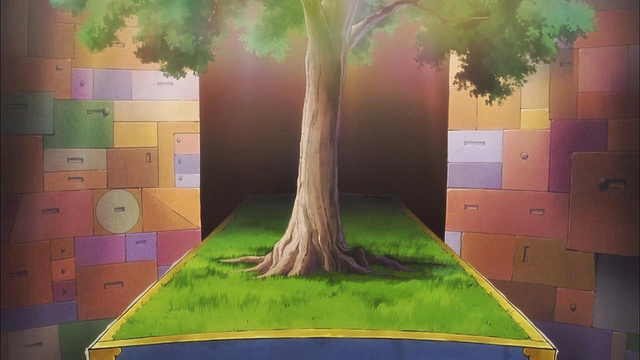
Yase enshrines the past; she can never give up on any object which reminds her of her childhood, of her precious memories. She literally hoards her precious memories in a magical drawer. Yakushimaru, also known as Myoue the younger can’t move on with his life, can’t accept responsibility, because he says to himself that he never truly wished to be alive in the first place, he never wanted responsibility – he just wants to be re-united with his parents, whom he resents for abandoning him, for entrusting him with their responsibilities, and for bringing him back to life.
It is the eldest sibling, Kurama, who wishes to forge his new future. He wishes to bring about change, he wishes to escape this place which he rules, his prison. He wishes to meet his parents, so he could be freed from the past, and as such he manipulates his siblings, forcing them to adapt, forcing them to grow up, and brings about the fated re-union. And then we have the youngest sibling, Koto, who has no past, but only future. Koto, whose soul is in anguish over not having a family, not having people to comfort her, and who wishes to know where she had come from. Koto, whose knowledge of her father is a secret, and who ended up meeting her siblings in her desperate search for her mother, whom she had never met.
The setting sets this up quite nicely. We find out in the end that Myoue is the true ruler, the god of Mirror Kyoto, and that this weird place reflects him, and so, nothing remains broken, that whatever is broken immediately reforms is a reflection of his nature. Myoue wishes to return to his childhood, he wishes to remain in a crib where nothing ever advances, where he never grows up, and nothing is ever asked of him, and the world around him works hard to conform to his desires.
Koto, unlike the past-facing Myoue, only has a future (and she is just as unhappy as he is for the missing tense), she is an avatar of change, and as such, anything she breaks remains broken. When the show is about to end, and Koto wishes to convince Myoue to live, she uses her reality-bending hammer as they travel to meet their parents, as they are surrounded by images of their past, and smashes them. She literally smashes their past, in order to make room for their future. It is not a coincidence she does so just before the reunion with their parents – to stand equal to one’s parents, one has to let go of the past. Forging a new family means letting go, or transforming the meaning of the old one.
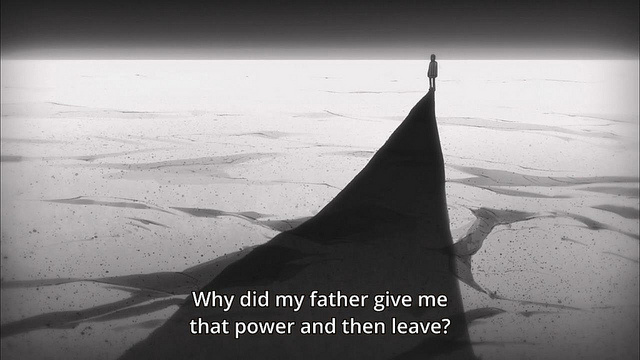
And then, as we grow up, we learn our parents aren’t all that different from us. Our parents are also their own parents’ children. People who watched the show and enjoyed the family drama often complain about episodes 8-9, and somewhat episode 10, are mythic, for a story that focuses entirely on one family, and is so immediate, so intimate, it seems quite a disconnect, and even a return to the boundless energies of episode 00 here, and it doesn’t make a lot of sense. But even though the story is told on a mythic scale, as it is a story of deities, I think focusing on it misses the whole point, it’s still very much about families, very much about assuming your parents’ roles, of replacing them, and this is merely the way it is told.
Episodes 8-10 are very much Inari, or Myoue the elder, or God‘s story. We find out that this bigger than life adult that we’ve waited for so long, that we trusted to set things right, that we treated as a god all along, because he’s our dad, is just like us – he’s unsure of himself, and how others perceive him, he too was thrust into his current role by a father who simply walked away and left him in charge, without asking for his own opinion, his own desires, so he had simply done the same to his children.
Families are cycles without end. The parents entrust their children with their own hopes and dreams, with their own roles, and the children resent that, even as they seek to prove their worth to their parents, and to show them how they have surpassed them. We forever seek to leave our family-story, to leave the footsteps of our parents, but our parents leave us their footprints, even as their parents had done to them, and whenever we meet our parents, we cannot help but be returned to that state of childhood, of helplessness, of wishing to be comforted. Our parents may have been gods, but they’re just our parents, and they too are just children who wish for their parents’ return, and who just hope that we, their children, love them.
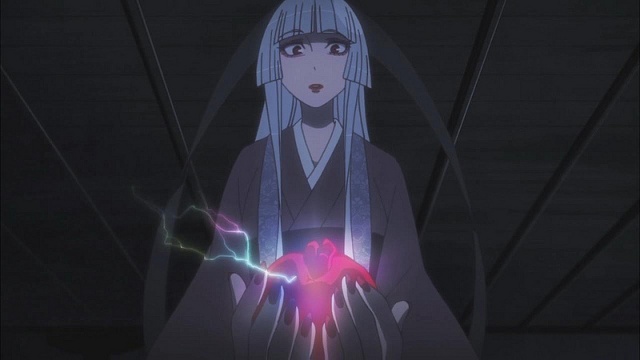
There is just so much to discuss in this show – not only is the cyclical way in which the story is told one that mirrors the theme of the show, but it also makes good use of visual metaphors (the pomegranate of life) to convey its themes – just like in Mawaru Penguindrum, and drawing from Greek mythology, the pomegranate is the life given from Myoue to Yakushimaru, who then entrusts his life to his younger sister, showing his desire to not only put his hopes in her, but also relinquish his life, which is the true core to understanding his personality. Yase actually calls her brother “Oedipus”, in case we missed how much he desires to be re-united with his mother, and considering how much this story revolves around Yakushimaru assuming Myoue’s place, and Myoue assuming his own father, the Creator’s, place, I’m surprised the story didn’t end in patricide (father-murder), just as Zeus had slain Cronus, and Cronus had slain Uranus, their own respective fathers, in Greek mythology.
Yes, towards the end we have a bit too much talking, and in episode 10 the show actually lays out its themes explicitly, but considering how often I’ve seen people misunderstand Inari’s character, or the themes of the show (being too hung up about “plot”, such as worlds colliding and ending, literally, rather than how this family is meeting its own very personal reckoning), I can’t say I fault the show too much for laying it out bare, so by the time the show is done as many people as possible could appreciate it for what it is.
I can’t help but give Kyousougiga a 10/10 cyclical and mythical storytelling score. The show has some issues, such as the wild tonal shifts, or the seemingly irrelevant move to mythic storytelling, but a show having imperfections does not mean it can’t be a perfect show, one where the rich symbolism (oh man, the pomegranate), or the boundless energy, or the intimate story, add up to one perfect show.
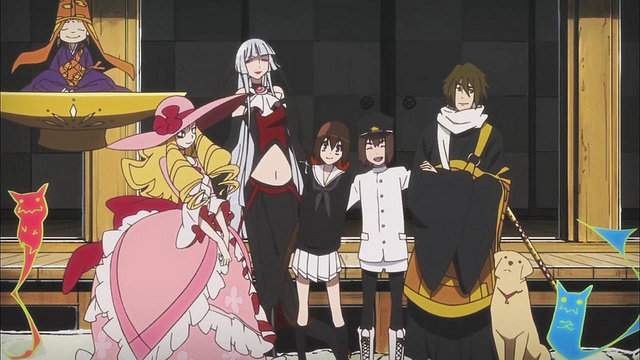
I want to take a special moment to commend the show on its visual direction, which had carried ably its boundless energy, its manic need to express itself, and did so not just through vivid colours and striking set-pieces, but the aforementioned visual metaphors. The soundtrack as well, had been uplifting, sad, and all-in-all, drew you in. I can’t say enough good things about this show’s direction, of plot, visuals, and sound.
Check this image album for many striking shots from the show, from episode 3 onward.
You should watch it. And should you want for another show which revolves around the absence of a patriarch, a show told in the present but circles around an event in the past, where telling the past illumines the present, with more than a touch of the fantastic, and a vivid and bold artistic design, then you should watch Uchouten Kazoku (The Eccentric Family), another family drama with fairy-tale like qualities from 2013.
Also, feel free to check my episodic notes on the show, which cover my thoughts as I’ve watched the episodes, and there truly had been a lot to cover.
Related articles
- Kyousogiga, a Home Like Any Other (wrongeverytime.com)

Reblogged this on compass on my field trip.